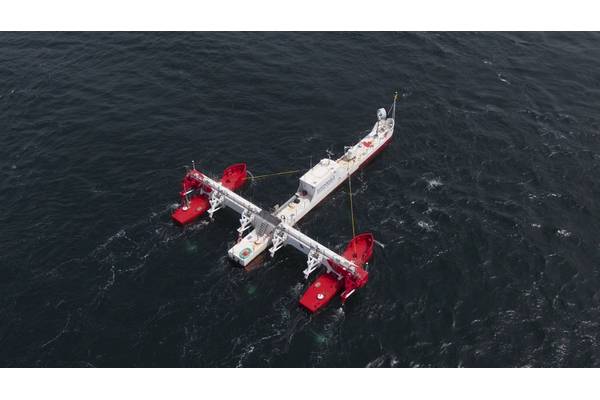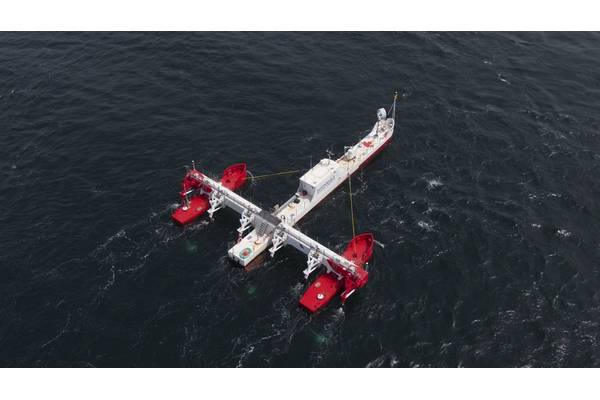

Sustainable Marine Energy (Canada) Ltd, which describes itself as Canada’s most successful tidal energy company, has been placed into voluntary bankruptcy and appointed Deloitte Restructuring Inc. as trustee.
The company, which proved out its technology and delivered power to Nova Scotia’s grid, said Monday it had not been able to secure the authorizations it had required or agree a viable path forward with Fisheries and Oceans Canada (DFO) that would enable it to deliver its flagship demonstration project at the Fundy Ocean Research Center for Energy (FORCE) tidal energy demonstration site in the Minas Passage.
"Because of this, Sustainable Marine is not able to meet its obligations to its project financing partners," Sustainable Marine Energy (Canada) Ltd.
Last year, Sustainable Marine said it had become "he first firm in the world to successfully harness the enormous tidal currents in the Bay of Fundy and sell power to Nova Scotia’s grid using its innovative floating in-stream tidal platform (PLAT-I)."
The achievement, the company said, marked a significant milestone both for the company and Canada’s broader marine energy ambitions, demonstrating that the immense tidal energy resource - "containing four times the combined flow of every freshwater river in the world – can be effectively utilised, delivering up to 2500MW of clean and predictable energy."
Significant grant support was provided by Natural Resources Canada (NRCan) and the project at Grand Passage was delivered under a license provided by the Province of Nova Scotia. An authorization to operate a single platform during daylight hours only was provide by DFO. Sustainable Marine planned to leverage the learning gained from the extensive testing of environmental monitoring technologies and methodologies performed in Grand Passage to deliver the Pempa’q Instream Tidal Energy Project at FORCE, in the Minas Passage.
Sustainable Marine Energy (Canada) Ltd said that this "carefully staged, step-by-step approach," enabled the team to manage technical risks and prove the "ultra-low environmental impact of its technology, through the most ambitious and advanced Environmental Monitoring programme ever conducted in the tidal energy sector."
"With support from world-leading fish tracking and subsea imaging experts, more than 5000 hours of video data was amassed over a five-year period, beginning in 2018. Findings remained consistent with all other studies completed over the last 20 years involving the deployment and operation of horizontal-axis in-stream tidal turbines around the world, with no negative interactions or harm to marine life observed," Sustainable Marine Energy (Canada) Ltd said.
According to Sustainable Marine Energy (Canada) Ltd, the demonstration project at Grand Passage was heralded "a major success" for Canada’s marine energy sector, and Sustainable Marine was on track to start the delivery of its next project at FORCE, which would be delivered in phases, starting with a three platform array.
Substantial investments made
As part of the world-first initiative, Sustainable Marine made substantial investments that would enable it to safely and successfully deliver its project at the highly energetic FORCE site, which has proven to be very challenging to operate in. This included the construction of the Tidal Pioneer - the most advanced inshore construction vessel on the Eastern seaboard, equipped with 4-point mooring and dynamic positioning systems.
Operations suspended amid regulatory uncertainty
"Recently, the firm suspended its operations at Grand Passage, while conversations with government officials and the project investors continued to take place," Sustainable Marine Canada said.
Sustainable Marine CEO Jason Hayman said a decision was made to place the company into voluntary bankruptcy after receiving a letter from the Minister of Fisheries, Oceans and the Canadian Coast Guard, which failed to provide investors with any confidence or certainty.
"It did not answer questions posed to the department about the risk assessment methodology used - or shed any light on what a transparent regulatory process for the delivery of tidal energy projects in Canada could look like," the company said.
Hayman said that the firm has attempted to work with DFO over the past five years to come up with different approaches to press ahead, including staged deployments with various forms of environmental monitoring.
He further highlighted that DFO's claims of 'openness' towards a short-term installation of a single turbine in the Minas Basin, for continued environmental monitoring, have been propagated for more than 18 months. Yet repeated discussions have never materialized into authorization, in spite of Sustainable Marine's strong desire to proceed, the company said.
20 people lose jobs
“We are enormously disappointed to be closing our business in Canada” he said. “Despite extensive environmental monitoring with no harm to marine life observed, DFO will not provide permission to proceed, nor a clear pathway or regulatory framework for the project to continue.
"This is a great shame considering not only our technology is ready, but there have also been massive investments in the tools and infrastructure necessary to deliver the project.
I hope that officials within DFO will be able to come forward with a clear explanation to our team of 20 hard-working people in Nova Scotia, who have lost their jobs, plus many good and well-meaning people in Canada, Germany, and the UK who have invested in the development of a clean and ultra-low environmental impact means of generating electricity.
"Like us, these people believed we were operating in a jurisdiction which places a high-value on transparency and science-based decision making, that wanted to accelerate the deployment of these types of solutions to help mitigate the impacts of climate change.
“In spite of this, Sustainable Marine’s efforts in Canada remain a huge success. We have proved what some thought was impossible, providing a pathway to generate clean, predictable tidal energy in a safe and effective manner. We are frustrated that we won’t get to see the benefits of years of hard work. As technology innovators, we are used to solving problems and developing solutions. However, in order to get these solutions deployed and functioning for everyone’s benefit we need policy makers and regulators to innovate as well.
“I would like to thank our employees, and community, Indigenous and industry partners who worked with us to advance our projects at Grand Passage and at FORCE.”
To secure the site at Grand Passage and to ensure no lasting environmental impact, the PLAT-I platforms have now been placed into storage, with all equipment removed from the seabed at the site.